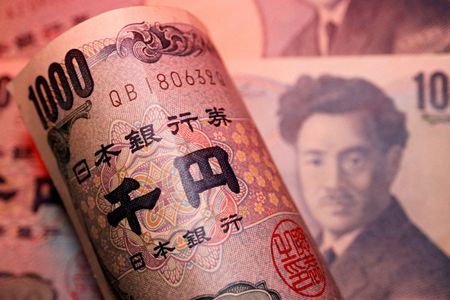By Rae Wee
SINGAPORE (Reuters) – Japan’s yen, long favoured as a safe-haven and funding currency, has in recent weeks become so enmeshed in market speculation over central bank policy that Wednesday’s decision to retain the status quo set off the steepest yen fall in nearly three years.
The yen dropped more than 2% after the Bank of Japan said it was sticking to its controversial yield control policy, in defiance of market expectations of a tweak to its yield cap or other settings. Those expectations had driven a 14% rally in the yen in the past three months. In the bond market, where the central bank has battled bond bears to defend its yield cap, the BOJ has bought up so many of Japan’s outstanding 10-year government bonds that market liquidity has virtually dried up.
Speculators have looked instead to the yen, an easier target where their bets on BOJ policy have induced massive swings and historic levels of volatility.
Moh Siong Sim, currency strategist at Bank of Singapore, said it was a question of when, not if, the BOJ shifts its ultra-dovish stance, and the market would continue to test that by pushing the yen higher.
“For our clients, they think of the yen as a funding currency. That may have to shift,” Sim said.
Until late last year, the BOJ’s dovishness in the face of aggressive rate rises by the Federal Reserve and other major central banks meant the yen was cheap and weak, making it the perfect currency to borrow for investments.
But it’s not so easy now, Sim said.
“A one-sided story is starting to flip around, and now it involves a bit more of a balancing act, between the low borrowing cost and currency moves.”
As the yen rallied more than 15% from October’s 32-year low of 151.94 per dollar to last week’s peak near 127, volatility spiked. The overnight volatility priced into yen options is around a six-year high of 54%.
BIGGER YEN BETS
Analysts expect bets on the BOJ soon abandoning its yield curve control policy will get bigger and louder, for a number of reasons.
Some investors expect the central bank to use evidence of rising inflation and a change of the guard at the BOJ in April as an excuse to make a move. Domestic investors say the pressures of managing a highly distorted yield curve and increasing bond market dysfunction are sufficient reason for the BOJ to act.
Most of that speculation has to be channelled into the yen.
Tareck Horchani, head of dealing, prime brokerage, at Maybank Securities, said macro funds have been buying derivative structures and put options on the dollar-yen pair, betting on the yen heading to 115 or 110.
Even equity fund managers investing in Japan have stopped hedging their currency exposure in the hope of cashing in on yen appreciation, he said. James Athey, an investment director at fund manager abrdn, has held a long position on the yen for a while.
“We were quite well-positioned for the move in December from the BOJ. We had a significant overweight on the Japanese yen, (and) in the aftermath, we took profit on some of our yen position,” Athey said.
Rises in bond yields and the yen could create a vicious tailwind of fund repatriation flows into Japan, yet some investors expect the yen’s path higher won’t follow a straight line.
Among those watching from the sidelines are hedge funds that took a hit on their short-yen trades, which were hugely profitable for about 10 months of 2022 until a swift reversal in the yen in the last few months.
“Macro hedge funds that lost money in the final months of 2022 on their long-dollar positions are just mildly positioned for a yen rally and are worried about a sharp reversal,” said Maybank’s Horchani.
Such uncertainty is also a challenge for the allocations of stock investors, who benefited from a cheaper yen last year as exports became more competitive and many Japanese companies got an earnings boost, lifting the Nikkei.
“The debate around the future of BOJ policy is far from settled,” said Howard Smith, partner and portfolio manager at Indus Japan Strategies.
Smith still sees value in Japanese assets and companies as the yen heads for 120 per dollar, or even 110, but for now he is only partially unhedged in his fund’s long-short products.
(Reporting by Ankur Banerjee, Rae Wee and Tom Westbrook in Singapore, Summer Zhen in Hong Kong and Nell Mackenzie in London; Editing by Vidya Ranganathan and Edmund Klamann)

